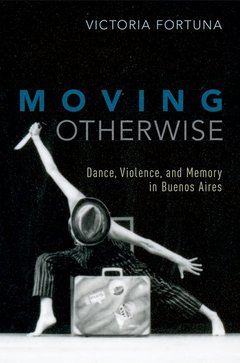Description
Moving Otherwise
Dance, Violence, and Memory in Buenos Aires
Author: Fortuna Victoria
Language: English
Moving Otherwise
Publication date: 01-2019
276 p. · 23.9x16 cm · Hardback
Publication date: 01-2019
276 p. · 23.9x16 cm · Hardback
Moving Otherwise
Publication date: 01-2019
280 p. · 23.4x15.5 cm · Paperback
Publication date: 01-2019
280 p. · 23.4x15.5 cm · Paperback
Description
/li>Biography
/li>
Moving Otherwise examines how contemporary dance practices in Buenos Aires, Argentina enacted politics within climates of political and economic violence from the mid-1960s to the mid-2010s. From the repression of military dictatorships to the precarity of economic crises, contemporary dancers and audiences consistently responded to and reimagined the everyday choreographies that have accompanied Argentina's volatile political history. The titular concept, "moving otherwise" names how both concert dance and its off-stage practice and consumption offer alternatives to and modes to critique the patterns of movement and bodily comportment that shape everyday life in contexts marked by violence. Drawing on archival research based in institutional and private collections, over fifty interviews with dancers and choreographers, and the author's embodied experiences as a collaborator and performer with active groups, the book analyzes how a wide range of practices moved otherwise, including concert works, community dance initiatives, and the everyday labor that animates dance. It demonstrates how these diverse practices represent, resist, and remember violence and engender new forms of social mobilization on and off the theatrical stage. As the first book length critical study of Argentine contemporary dance, it introduces a breadth of choreographers to an English speaking audience, including Ana Kamien, Susana Zimmermann, Estela Maris, Alejandro Cervera, Renate Schottelius, Susana Tambutti, Silvia Hodgers, and Silvia Vladimivsky. It also considers previously undocumented aspects of Argentine dance history, including crossings between contemporary dancers and 1970s leftist political militancy, Argentine dance labor movements, political protest, and the prominence of tango themes in contemporary dance works that address the memory of political violence. Contemporary dance, the book demonstrates, has a rich and diverse history of political engagement in Argentina.
Victoria Fortuna is an Assistant Professor in the Dance Department at Reed College in Portland, OR. Her research interests include Latin/x American concert and social dance, dance as a mode of political and community organization, and cultural histories of dance in transnational perspective.
© 2024 LAVOISIER S.A.S.




